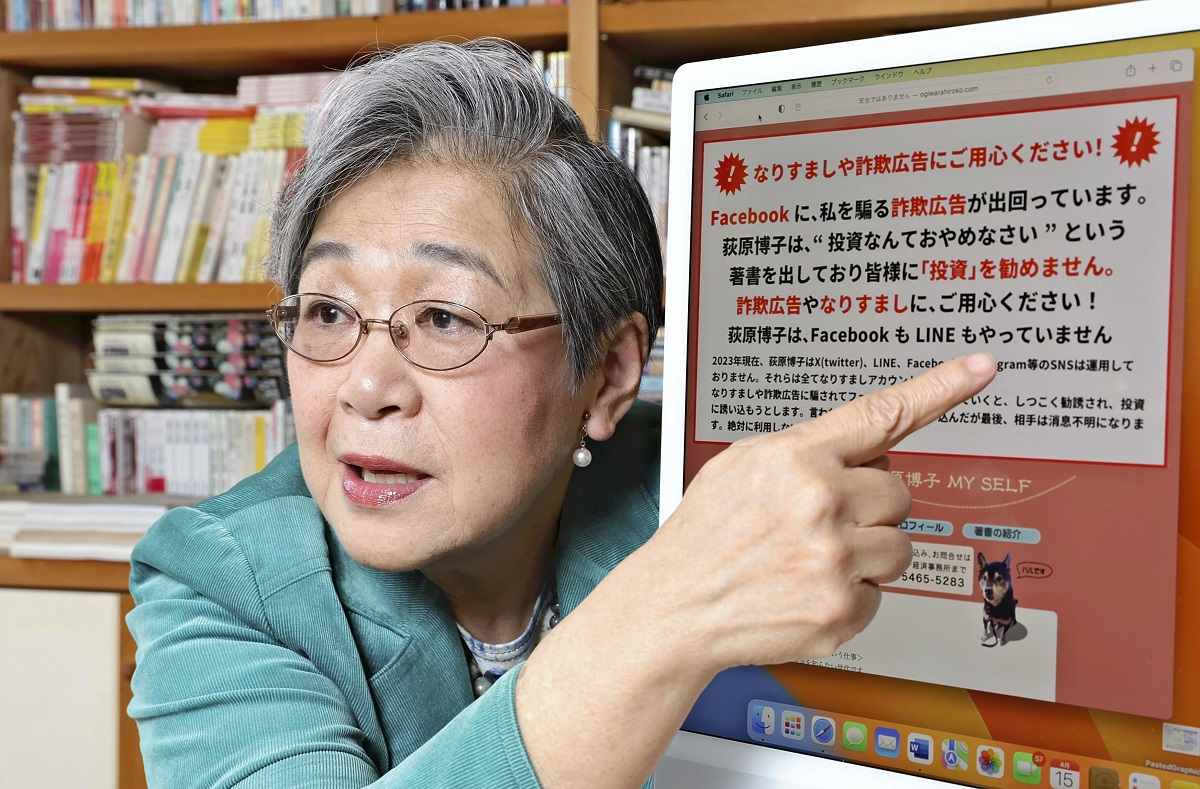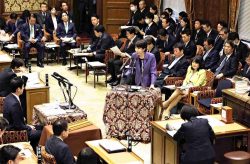
Hiroko Ogiwara, an economic journalist, calls for caution against fake ads on April 15 in Tokyo.
6:00 JST, April 22, 2024
Fake ads luring victims in to make investments “endorsed” by well-known businesspeople is becoming a growing problem on social media. Many of these ads have been found on Facebook and Instragram, operated by Meta of the United States. Well-known businesspeople who have been impersonated have protested Meta while victims say they were scammed out of large sums of money.
Hiroko Ogiwara, an economic journalist, on April 15 expressed her resentment on the situation: “I have never endorsed any investments to anyone, and I don’t use social media services. This is unbelievable.”
Ogiwara learned about the scams around June last year when a publisher contacted her, saying, “Someone impersonating Ms. Ogiwara is endorsing investments on Facebook.” Several images of her books were used without permission in a fake investment ad.
According to Ogiwara, the publisher requested Meta to remove them, but she received no response. She has called on people to be careful of such fake advertisements on her website and in her seminars. However, her office still receives inquiries from victims who believe they have been deceived.
“I have been discredited, and victims are devastated as their lives have been ruined,” Ogiwara said. “It is Meta’s responsibility to take down these ads.”
The number of well-known businesspeople who have become the victims of such impersonation is numerous, including entrepreneurs Yusaku Maezawa and Takafumi Horie.
When Maezawa and Horie requested Meta to take down fake ads falsely endorsed by them, the U.S. company reportedly responded that the ads were not illegal. Meta also said that it was not possible to take down every ad due to a large number of them. Fake videos, which appear to have been created with the use of generative artificial intelligence, have also been found online.
Meta screens advertisements using automatic detection technology and human moderators. But Hokuto Kasai, representative director of Japan Affiliate Organization, a Tokyo-based body composed of companies that order online advertisements, says this measure is insufficient.
In Meta advertisements, simplified Chinese characters — used in mainland China — were often mixed in with kanji for ads targeted towards Japanese investors. Kasai found that a significant number of these fake advertisements appear to come from China and Southeast Asian nations. He said, “It should be possible to prevent scams to a certain degree by simply excluding unnatural ones automatically.”
Top Articles in Society
-

Producer Behind Pop Group XG Arrested for Cocaine Possession
-

Man Infected with Measles Reportedly Dined at Restaurant in Tokyo Station
-

Man Infected with Measles May Have Come in Contact with Many People in Tokyo, Went to Store, Restaurant Around When Symptoms Emerged
-

Woman with Measles Visited Hospital in Tokyo Multiple Times Before Being Diagnosed with Disease
-

Australian Woman Dies After Mishap on Ski Lift in Nagano Prefecture
JN ACCESS RANKING
-

Producer Behind Pop Group XG Arrested for Cocaine Possession
-

Japan PM Takaichi’s Cabinet Resigns en Masse
-

Man Infected with Measles Reportedly Dined at Restaurant in Tokyo Station
-

Israeli Ambassador to Japan Speaks about Japan’s Role in the Reconstruction of Gaza
-

Videos Plagiarized, Reposted with False Subtitles Claiming ‘Ryukyu Belongs to China’; Anti-China False Information Also Posted in Japan






















